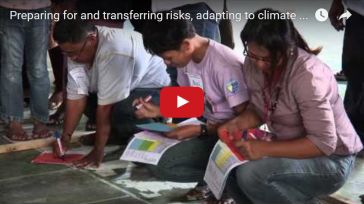Videos and Photos
2013
-

Asia-Pacific YouthNet Talk show
The new youth opportunities in Myanmar
15 May 2013
Listen to Steve Marshal, the ILO liaison officer in Yangon, and Sandar Soe, from the FTUB trade union federation, talk about the challenges and opportunities young workers are facing as the country undergoes a period of gradual reforms.
-
Video
Creating human security through local economic development
15 May 2013
In Bondoc Peninsula, south-eastern part of Quezon Province in the Philippines, people earn less than US$1 per day. Lack of decent work, extreme poverty and armed conflict pushed people to vulnerable employment and forced them to accept whatever work is available just to survive. The ILO, FAO and the Office of the Presidential Adviser on the Peace Process implemented projects on local economic development, in partnership with the Government of Japan and the UN Trust Fund for Human Security. These projects reached out to over 5,000 individuals, bringing decent work, much needed income, and hope for their families and communities. These projects must continue.
-
Video
Creating human security through local economic development (full 15-minute video documentary)
15 May 2013
In Bondoc Peninsula, south-eastern part of Quezon Province in the Philippines, people earn less than US$1 per day. Lack of decent work, extreme poverty and armed conflict pushed people to vulnerable employment and forced them to accept whatever work is available just to survive. The ILO, FAO and the Office of the Presidential Adviser on the Peace Process implemented projects on local economic development, in partnership with the Government of Japan and the UN Trust Fund for Human Security. These projects reached out to over 5,000 individuals, bringing decent work, much needed income, and hope for their families and communities. These projects must continue.
-

Video
Global employment trends for youth 2013 - A generation at risk
08 May 2013
An estimated 73.4 million young people - 12.6 per cent – are expected to be out of work in 2013, and the picture is only set to get worse say Sara Elder and Theo Sparreboom, authors of the Global Employment Trends for Youth 2013 report. Youth face persistent unemployment, a proliferation of temporary jobs and growing discouragement in advanced economies; and poor quality, informal, subsistence jobs in developing countries. There is no one-size-fits-all solution, but as Sara Elder and Theo Sparreboom explain, there are measures that governments - as well as trade unions and employers - can take to boost youth employment.
-

Bonded labour
Tackling Bonded Labour in Tamil Nadu
03 May 2013
In India's Tamil Nadu state, thousands of people desperate for money are offered advance payments to work in the region's many brick kilns. While this system has worked well enough in the past for both employers and workers, many workers run the risk of "debt bondage" because they cannot leave the worksite until they repay the advance in full. But the situation is changing now, by ILO working with government and employers, and showing workers how they can take more control of their own lives.
-
Video
Creating a competitive labour force: An interview with Lawrence Jeff Johnson on ANC Inside Business
01 May 2013
ABS-CBN News Channel's Inside Business with Coco Alcuaz interviewed Director Lawrence Jeff Johnson of the ILO Country Office for the Philippines and former Labour and Employment Secretary, Mr Bienvenido Laguesma as part of Labour Day 2013. Director Johnson talked about achieving sustained and inclusive growth through decent and productive work. Director Johnson further highlighted the need to address vulnerable employment and to enhance productivity and competitiveness in the Philippines.
-

APYouthNet Talk Show #18
APYouthNet Talk Show #18 - Youth employment and access to finance
25 April 2013
Lyn Kok, President & CEO of Standard Chartered Bank Thailand discusses the role and prospects of corporate banking in the field of microfinance, and its impact on youth employment.
-

Video
Why is social protection important to me?
22 April 2013
Public Service Announcement on the Social Protection Floor in Thailand
-
Video
Promoting fire safety in Bangladesh
17 April 2013
An animated film on how to improve work safety against fires in garment factories in Bangladesh
-

Video
Preparing for and transferring risks, adapting to climate change
09 April 2013
In the Southern Philippines, farmers' lives and the weather are intimately interwoven, but something is changing, now that the rains in Agusan del Norte are too heavy, the sun shines too fiercely. Now there's hope for poor farmers with the community-based approach monitoring and Weather Index-Based Insurance packages, to warn people when heavy weather is on the way.